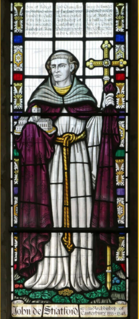Related Research Articles
Robert Winchelsey was an English Catholic theologian and Archbishop of Canterbury. He studied at the universities of Paris and Oxford, and later taught at both. Influenced by Thomas Aquinas, he was a scholastic theologian.
Walter Reynolds was Bishop of Worcester and then Archbishop of Canterbury (1313–1327) as well as Lord High Treasurer and Lord Chancellor.

John de Stratford was Archbishop of Canterbury, Bishop of Winchester, Treasurer and Chancellor of England.

William Melton was the 43rd Archbishop of York (1317–1340).

Godfrey Giffard was Chancellor of the Exchequer of England, Lord Chancellor of England and Bishop of Worcester.
Nicholas of Ely was Lord Chancellor of England, Bishop of Worcester, Bishop of Winchester, and Lord High Treasurer in the 13th century.

Simon Mepeham was Archbishop of Canterbury from 1328 to 1333.

The Archbishop of York is a senior bishop in the Church of England, second only to the archbishop of Canterbury. The archbishop is the diocesan bishop of the Diocese of York and the metropolitan bishop of the Province of York, which covers the northern regions of England as well as the Isle of Man. The archbishop of York is an ex officio member of the House of Lords and is styled Primate of England; the archbishop of Canterbury is the Primate of All England.
Herbert Poore or Poor (died 1217) was a medieval English clergyman who held the post of Bishop of Salisbury during the reigns of Richard I and John.
Adam Orleton was an English churchman and royal administrator.

John Hotham was a medieval Chancellor of the Exchequer, Lord High Treasurer, Lord Chancellor and Bishop of Ely. He was also effective Governor of Ireland for a time.
Richard Hill was a medieval Bishop of London.
William Middleton was a medieval Bishop of Norwich.

John was a medieval Bishop of Rochester.
Walter was a medieval Bishop of Rochester.
Gilbert Glanvill or Gilbert de Glanville was a medieval Bishop of Rochester.

Hamo Hethe was a medieval Bishop of Rochester, England. He was born about 1275 in Centuries, Hythe. He was elected on 18 March 1317 and consecrated on 26 August 1319. He resigned the see early 1352 before his death 4 May 1352.
Richard de la More was a medieval clergyman who was Bishop-elect of Winchester from 1280 to 1282.
William of Northall was a mediaeval Bishop of Worcester.
William de Blois was a medieval Bishop of Worcester.
References
- British History Online Archdeacons of Lewes accessed on September 11, 2007
- British History Online Bishops of Worcester accessed on September 11, 2007
- Fryde, E. B.; Greenway, D. E.; Porter, S.; Roy, I. (1996). Handbook of British Chronology (Third revised ed.). Cambridge: Cambridge University Press. ISBN 0-521-56350-X.
- Weir, Alison Queen Isabella: Treachery, Adultery and Murder in Medieval England New York: Ballantine 2005 ISBN 0-345-45319-0